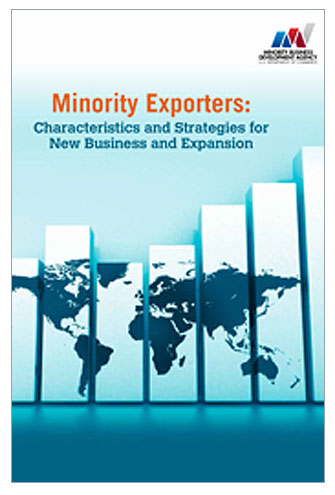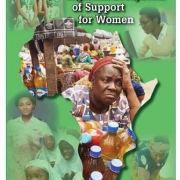Minority Exporters: Characteristics and Strategies for New Business and Expansion
U.S. Department of Commerce, Minority Business Development Agency
By: Sharon T. Freeman, Ph.D.
Published Fiscal Year 2015
This publication was developed by the Minority Business Development Agency (MBDA), a bureau within the U.S. Department of Commerce. Sharon T. Freeman, Ph.D. authored this report with contributions and guidance from MBDA and the U.S. Department of Interior’s Federal Consulting Group. We would like to acknowledge Adam Goldman, former MBDA Research Analyst, and Nicol Turner-Lee, Ph.D. Research Expert, for their thorough review and editing. We would also like to thank Kimberly R. Marcus, former Associate Director for Legislative, Education and Intergovernmental Affairs, for her stewardship; and Joann J. Hill, Chief of the Office for Business Development, for her input. MBDA acknowledges feedback and comments received from the staff at the Bureau of Economic Analysis, Nikolas Zolas and Sue Helper, and the U.S. Census Bureau’s, Katherine Russell and Anthony Caruso.
Foreward
Exporting is good for American business, American workers and the creation of American jobs – it stabilizes families and revitalizes communities. With 95 percent of the world’s consumers outside of the U.S., exporting as a strategy for growth in size and scale cannot be ignored. Minority business enterprises (MBEs) are uniquely qualified and equipped to enter global markets. They are: twice as likely to export; three times as likely to already have international operations and six times as likely to transact business in a language other than English. These operational factors strategically position MBEs to be successful exporters. As President Obama leads the nation from crisis to recovery, MBEs join all businesses in the restoration of American competitiveness in domestic and global markets.
This national effort is showcased in the National Export Initiative (NEI) which has successfully doubled U.S. exports in five years. For the fifth consecutive year, U.S. exports have set an all-time record, reaching $2.35 trillion in revenue in 2014. In that same year, U.S. export goods increased 2.7 percent to a record of $1.64 trillion in key industry sectors: capital goods; consumer goods; petroleum products; food and beverage; automotive vehicles and parts. Simply put: when America exports, America prospers. Under President Obama’s leadership, we have shifted our economy from a consumer focus, back to the production of goods and services, and created the conditions necessary for fair trade: advocacy, export financing, removal of export barriers, trade enforcement and international trade promotion. This ever leveling playing field has garnered us access to leading export markets in Canada, Mexico, and China. Through the NEI five-point strategy, the U.S. is returning to global leadership in foreign markets and MBEs are a part of that national economic restoration.
The vehicle for our global market engagement is a historic number of Free Trade Agreements (FTAs). The U.S. currently has 20 formal trade agreements that support record U.S. exports totaling, $765.1 billion – an increase of 4.3 percent from 2013. In 2014, U.S. exports accounted for 11.3 million jobs, adding 1.6 million export-supported, living-wage jobs to the economy since 2009. Based on the most recent available data from the U.S. Census Bureau, our report, Minority Exporters: Characteristics and Strategies for New Business and Expansion, shares the unique characteristics of exporters. The report also offers comparisons to both non-exporting counterparts and nonminority exporters to glean both the opportunities and challenges faced when MBEs conduct business globally.
The data in the report represents good news for MBE exporters: more than 28,000 MBEs exported goods and services valued at over $30 billion in 2007, representing 17.5 percent of all classifiable exporting businesses in the United States. For MBEs, significant engagement in international sales and trade, leads to stronger businesses, creates new jobs, and in the long-term, contributes to the sustainability of the commercial ecosystems necessary to create thriving communities.
The success of U.S. exporting programs continues under the leadership of U.S. Commerce Secretary Penny Pritzker through NEI NEXT, a new customer service-driven strategy with improved information resources that ensures American businesses can capitalize on expanded opportunities to sell their goods and services abroad. NEI/NEXT will help even more American companies reach more overseas markets by improving data, providing specific export opportunities, access to export financing, and partnering with states and communities to sustain local export efforts.
The Minority Business Development Agency (MBDA) is pleased to be a foundational partner in the President’s ongoing efforts to increase U.S. exports. Minority entrepreneurs have the cultural insight, linguistic skills and market intelligence to not only excel as U.S. exporters, but to also be strong strategic partners for those entering global markets for the first time. According to 2007 U.S. Census data, MBEs are three times as likely to generate 100 percent of their revenue from exports – making MBEs strong allies in U.S. export strategies.
As the nation returns to its position of economic strength and global market leadership, minority entrepreneurs join all American businesses in adding value to the nation’s bottom line – creating jobs, restoring communities and instilling hope. We trust that the information presented in this report is both informative and instructive, featuring case studies of actual MBE exporters. This report is a part of MBDA’s ongoing commitment to offer relevant information on minority enterprises and the valued contribution to our nation’s social and economic well-being.



























